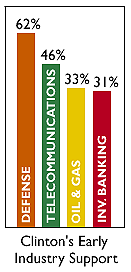Thomas Ferguson is a professor of political science at the University of Massachusetts, Boston, and a Mother Jones contributing writer. He is the author of many scholarly studies into money and politics, including Golden Rule: The Investment Theory of Political Parties and the Logic of Money-Driven Political Systems (Chicago: University of Chicago Press, 1995).
The sample of large investors and statistical methods used in this article follow the discussion in chapters 4 and 6 of Golden Rule. The sample includes firms and large private investors at the top of the American economic pyramid — specifically, the 400 largest firms listed in the Fortune 500; equally large, privately held firms; large Wall Street firms; and Forbes magazine’s 400 richest Americans. In contrast to many studies of campaign spending, this study looks at the individual contributions of the top officers of all the firms, as well as “soft money” and political action committee (PAC) donations.
 NOTE: This chart shows the percentages of companies in Ferguson’s sample that gave “early money” to Clinton’s presidential campaign. The sample contains a total of 774 firms/investors, including 13 defense contractors, 56 telecommunications firms, 45 oil and gas companies, and 35 investment banks. The results for telecommunications, defense, and oil and gas are all statistically significant at the .05 level or better, regardless of which significance tests one prefers, or precisely how one calculates the level of contributions. By contrast, the lower results for the investment bankers are always statistically borderline (.10 or worse) — a warning that this industry’s rate of early support for the Clinton campaign might not really differ from the low (20 percent) average of the sample as a whole. (All data comes from the Federal Election Commission.)
NOTE: This chart shows the percentages of companies in Ferguson’s sample that gave “early money” to Clinton’s presidential campaign. The sample contains a total of 774 firms/investors, including 13 defense contractors, 56 telecommunications firms, 45 oil and gas companies, and 35 investment banks. The results for telecommunications, defense, and oil and gas are all statistically significant at the .05 level or better, regardless of which significance tests one prefers, or precisely how one calculates the level of contributions. By contrast, the lower results for the investment bankers are always statistically borderline (.10 or worse) — a warning that this industry’s rate of early support for the Clinton campaign might not really differ from the low (20 percent) average of the sample as a whole. (All data comes from the Federal Election Commission.)















